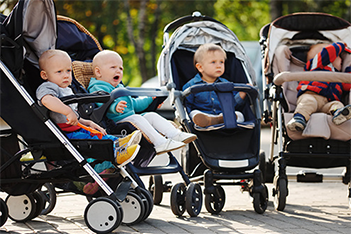
The export testing standards for infant and child products vary by country and region, mainly includ...

GST General Testing (GST) has been deeply involved in the field of testing and certification since its establishment in 2007, and has now grown into a highly influential third-party testing organization. The company has a large laboratory of over 6000 square meters, equipped with internationally advanced testing equipment, and has built a comprehensive and efficient testing platform, laying a solid foundation for the accuracy and reliability of testing data.
In terms of talent development, GST compliance testing has gathered over 100 professional talents and formed a professional team covering multiple fields. The team members not only possess solid professional knowledge, but also have rich practical experience. They maintain a keen insight into changes in domestic and international testing and certification standards and regulations, and can quickly tailor scientific and reasonable testing and certification plans based on customer product characteristics and target markets. International Testing and Certification Standards for Home Furnishings
EU standards
CE certification: In the field of home appliances, CE certification is a mandatory requirement for household appliances to enter the EU market, covering the Low Voltage Directive (LVD), Electromagnetic Compatibility Directive (EMCD), Energy Efficiency Directive (ErP), Directive on the Restriction of Hazardous Substances in Electrical and Electronic Products (RoHS), and Waste Electrical and Electronic Products Directive (WEEE). For example, according to the LVD directive, household appliances must meet safety requirements such as anti electric shock protection, overheating, and radiation, and the corresponding coordination standard is the EN 60335 series; In terms of electromagnetic compatibility, electrical appliances need to control the electromagnetic interference generated by themselves and have a certain anti-interference ability. Relevant coordination standards include EN 55014-1, EN 55014-2, etc. For household ladders, EN131 safety certification is required, and the testing content includes multiple items such as structural design, anti slip testing, and load-bearing testing to ensure the safety of product use.
Environmental protection and chemical substance restrictions: In terms of environmental protection and chemical substance restrictions, the European Union strictly controls harmful substances in household products, requiring products not to cause harm to the health and environment of users, and making clear restrictions on the use and content of harmful substances such as phthalates and polycyclic aromatic hydrocarbons.
American Standard
The Consumer Product Safety Commission (CPSC) in the United States strictly regulates the safety of imported household products. For products such as children's furniture, strict standards have been established for the content of harmful substances such as lead and formaldehyde. Atomic absorption spectrometers and other equipment are used to detect the content of related substances to prevent children from being threatened by exposure to harmful substances. At the same time, there are corresponding specifications for the physical performance of products to ensure product quality and safe use.
Japanese standard
F four-star standard certification: F four-star standard certification is the highest level in Japan's "F series" standards, with a limit value of 0.3mg/L for formaldehyde emissions, which is more stringent than the E0 standard. During testing, the testing area is 1800C square meters and edge sealing is not allowed. The testing is conducted under the condition of a water bath temperature of 65 ± 2 degrees to ensure the environmental friendliness of home products.
Other safety and quality standards: Japan also has clear standards for the structural safety, functional performance, and other aspects of household products to ensure that they meet the usage habits and safety requirements of Japanese consumers.
Indoor Air Quality Certification - GREENGUARD Certification
GREENGUARD indoor air quality certification is launched by UL in the United States and is an internationally recognized authoritative indoor product certification standard, covering more than 20 categories such as furniture and building materials. This certification adopts the "dynamic environment simulation cabin" detection technology to simulate the real indoor environment and detect more than 12000 volatile organic compounds released into the air by the product, ensuring that the product meets strict indoor air quality standards. Among them, GREENGUARD certification for children and schools is specifically designed for products in sensitive environments such as teaching places. All products bearing this certification mark undergo chemical volatilization testing in accordance with CA1350 standards.
Why choose general testing
Strong professional strength: The professional team of GST General Standard Testing has a deep understanding of various international testing and certification standards and regulations for household goods, and can provide accurate testing and certification solutions based on the characteristics of customer products, solving various technical problems encountered in the testing and certification process. Whether it's complex CE certification directives or strict GREENGUARD indoor air quality testing, the team can handle them with ease.
Advanced equipment support: The company is equipped with internationally advanced testing equipment, which can simulate various complex testing scenarios and meet the strict requirements of international testing and certification standards. From gas chromatography-mass spectrometry for chemical substance analysis to tensile testing machines for physical performance testing, everything is available to ensure the accuracy and reliability of detection data, providing strong guarantees for customers to obtain certification smoothly.
One stop service experience: GST testing provides one-stop service, from project consultation and testing implementation to report interpretation and certification guidance, customers do not need to travel between multiple institutions. The company can also provide value-added services such as regulatory policy interpretation and certification process guidance to customers, effectively reducing their testing and certification time and economic costs.
Good reputation witness: Over the years, GST General Standard Testing has helped numerous customers successfully enter the international market with professional services and high-quality testing and certification results, establishing a good reputation in the industry and becoming a reliable partner for customers to conduct international testing and certification of household products.